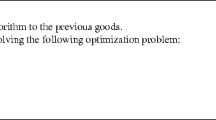Abstract
We study an online version of Fisher’s linear case market. In this market there are m buyers and a set of n dividable goods to be allocated to the buyers. The utility that buyer i derives from good j is u ij . Given an allocation \(\hat{U}\) in which buyer i has utility \(\hat{U}_i\) we suggest a quality measure that is based on taking an average of the ratios \(U_{i}/\hat{U}_i\) with respect to any other allocation U. We motivate this quality measure, and show that market equilibrium is the optimal solution with respect to this measure. Our setting is online and so the allocation of each good should be done without any knowledge of the upcoming goods.
We design an online algorithm for the problem that is only worse by a logarithmic factor than any other solution with respect to our proposed quality measure, and in particular competes with the market equilibrium allocation. We prove a tight lower bound which shows that our algorithm is optimal up to constants. Our algorithm uses a primal dual convex programming scheme. To the best of our knowledge this is the first time that such a scheme is used in the online framework.
We also discuss an application of the framework in display advertising business in the last section.
Access this chapter
Tax calculation will be finalised at checkout
Purchases are for personal use only
Preview
Unable to display preview. Download preview PDF.
Similar content being viewed by others
References
Arrow, K., Debreu, G.: Existence of an equilibrium for competitive economy. Econometrica, 265–290 (1954)
Aspnes, J., Azar, Y., Fiat, A., Plotkin, S.A., Waarts, O.: On-line routing of virtual circuits with applications to load balancing and machine scheduling. J. ACM 44(3), 486–504 (1997)
Awerbuch, B., Azar, Y., Grove, E.F., Kao, M.-Y., Krishnan, P., Vitter, J.S.: Load balancing in the lp norm. In: Proc. of 36th FOCS, pp. 383–391 (1995)
Blum, A., Sandholm, T., Zinkevich, M.: Online algorithms for market clearing. J. ACM 53(5), 845–879 (2006)
Borodin, A., El-Yaniv, R.: Online computation and competitive analysis. Cambridge University Press, Cambridge (1998)
Brainard, W.C., Scarf, H.E.: How to compute equilibrium prices in 1891. In: Cowles Foundations Discussion paper, p. 1270 (2000)
Buchbinder, N., Naor, J.: Online primal-dual algorithms for covering and packing problems. In: 13th Annual European Symposium on Algorithms (2005)
Buchbinder, N., Naor, J.: Improved bounds for online routing and packing via a primal-dual approach. In: Proceedings of the 47th Annual IEEE Symposium on Foundations of Computer Science (FOCS 2006) (2006)
Buchbinder, N., Jain, K., Naor, J.(S.).: Online primal-dual algorithms for maximizing ad-auctions revenue. In: Arge, L., Hoffmann, M., Welzl, E. (eds.) ESA 2007. LNCS, vol. 4698, pp. 253–264. Springer, Heidelberg (2007)
Buchbinder, N., Naor, J.(S.): The design of competitive online algorithms via a primaldual approach. Foundations and Trends in Theoretical Computer Science 3, 93–263 (2009)
Chakrabarty, D., Devanur, N.R., Vazirani, V.V.: New results on rationality and strongly polynomial time solvability in eisenberg-gale markets. In: Spirakis, P.G., Mavronicolas, M., Kontogiannis, S.C. (eds.) WINE 2006. LNCS, vol. 4286, pp. 239–250. Springer, Heidelberg (2006)
Devanur, N.R., Kannan, R.: Market equilibria in polynomial time for fixed number of goods or agents. In: FOCS, pp. 45–53 (2008)
Devanur, N.R., Papadimitriou, C.H., Saberi, A., Vazirani, V.V.: Market equilibrium via a primal-dual-type algorithm. In: FOCS, pp. 389–395 (2002)
Eisenberg, E., Gale, D.: Consensus of subjective probabilioties: The pari-mutuel method. Annual of mathematical statistics 30, 165–168 (1959)
Feldman, J., Korula, N., Mirrokni, V.S., Muthukrishnan, S., Pál, M.: Online ad assignment with free disposal. In: Leonardi, S. (ed.) WINE 2009. LNCS, vol. 5929, pp. 374–385. Springer, Heidelberg (2009)
Jain, K., Vazirani, V.V.: Eisenberg-gale markets: algorithms and structural properties. In: STOC 2007: Proceedings of the thirty-ninth annual ACM symposium on Theory of computing, pp. 364–373 (2007)
Mahdian, M., Saberi, A.: Multi-unit auctions with unknown supply. In: EC 2006: Proceedings of the 7th ACM conference on Electronic commerce, pp. 243–249 (2006)
Mehta, A., Saberi, A., Vazirani, U., Vazirani, V.: Adwords and generalized online matching. J. ACM 54(5), 22 (2007)
Nisan, N., Roughgarden, T., Tardos, E., Vazirani, V.V.: Algorithmic Game Theory. Cambridge University Press, New York (2007)
Scarf, H.: The computation of economic equilibria (with collaboration of t. hansen). In: Cowles foundation monograph, No. 24 (1973)
Stolyar, A.L.: Greedy primal-dual algorithm for dynamic resource allocation in complex networks. Queueing Syst. Theory Appl. 54(3), 203–220 (2006)
Author information
Authors and Affiliations
Editor information
Editors and Affiliations
Rights and permissions
Copyright information
© 2010 Springer-Verlag Berlin Heidelberg
About this paper
Cite this paper
Azar, Y., Buchbinder, N., Jain, K. (2010). How to Allocate Goods in an Online Market?. In: de Berg, M., Meyer, U. (eds) Algorithms – ESA 2010. ESA 2010. Lecture Notes in Computer Science, vol 6347. Springer, Berlin, Heidelberg. https://doi.org/10.1007/978-3-642-15781-3_5
Download citation
DOI: https://doi.org/10.1007/978-3-642-15781-3_5
Publisher Name: Springer, Berlin, Heidelberg
Print ISBN: 978-3-642-15780-6
Online ISBN: 978-3-642-15781-3
eBook Packages: Computer ScienceComputer Science (R0)





